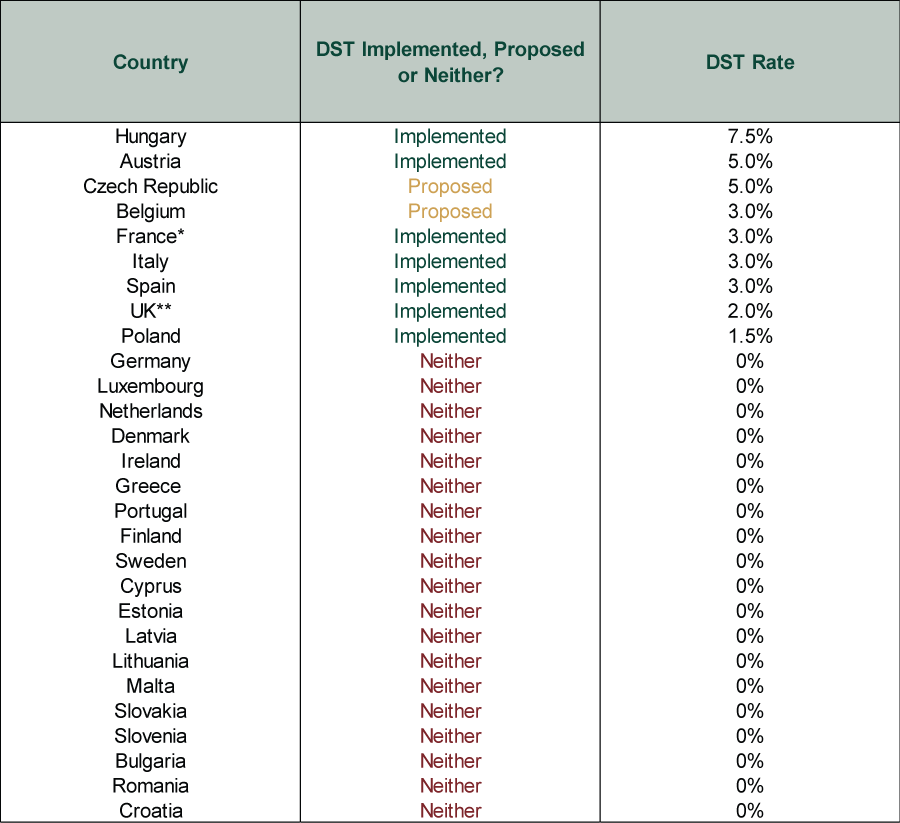Personal Wealth Management / Market Analysis
Much Ado About Digital Taxes
If an EU-wide digital tax ever materializes, available evidence suggests it isn’t much of a threat to big Tech and more likely lands on others.
“They aren’t paying their fair share!” In addition to concerns over competition, EU politicians’ standard criticism of huge US Tech firms is that they don’t pay much in local taxes, thanks to global tax rules. Hence, when they aren’t busy lobbying the US and other major nations to agree on changing these rules, they are threatening to adopt a unilateral digital services tax—a threat that returned to headlines recently as global talks once again fizzled. “Fair” is, of course, a squishy concept—one that is often politicized and hinges on who is speaking. MarketMinder doesn’t adjudicate “fairness” disputes. But it is worth considering a grand irony in this debate. There is ample evidence the EU’s digital taxes don’t—and won’t—make big Tech pay their “fair share.” They are a lot more likely to make normal Europeans pay up—one reason tax changes don’t seem like a huge threat to big Tech, whichever way the EU’s policy winds up going.
The EU has been considering a digital tax for eons. Currently, big Tech and Tech-like companies are subject to taxation only in countries where they have a physical presence. Naturally, this motivates them to set up shop in low-tax countries like Ireland and Luxembourg. Governments in other EU nations argue this unfairly prevents them from taxing commerce that occurs within their borders.[i] Partly in response to this, the Organization for Economic Cooperation and Development (OECD) has been exploring some kind of a global digital tax reform for years, but to no avail.
Attempting to remedy this, in March 2018, the European Commission (EC) proposed taxing digital companies with over €750 million annual global revenue and annual taxable EU revenue above €50 million based on users’ location. However, not all member states agreed, so an EU-wide digital tax failed to materialize. As a result, some countries have either imposed or proposed their own taxes. (Exhibit 1)
Exhibit 1: EU-27 and UK Digital Services Taxes
Source: Tax Foundation, as of 12/11/2020. *France initially suspended its digital services payments but reinstalled them as of December. **The UK is no longer part of the EU.
The OECD is now targeting an international agreement by mid-2021—just the latest of many deadlines over the years. Yet US negotiators still object. The EC has said it will go it alone next year if the OECD punts again.
However, even if they move forward, it will likely be a pyrrhic victory. Companies are really good at finding ways to prevent taxes like this from being much more than an administrative nuisance. Not just because the taxes, as outlined, are a teensy fraction of earnings—rather, because they easily find ways to pass the buck … err … euro.
Take the UK, for example. Its 2% tax on large Tech and Tech-like firms’ British revenues took effect in April. The Treasury estimated it would collect £500 million annually from these companies. However, they quickly found a way to pass it on to British customers—namely, advertisers, app developers and sellers. For example, in August, Amazon said it would increase charges on UK sellers—often small businesses—to counter its tax. Google did similarly. To counter digital levies in the UK (and Austria), it began charging advertisers a 2% fee (5% in Austria) in November. They even labeled it the “DST Fee”—DST for “Digital Services Tax.” It seems reasonable to expect similar measures EU-wide if the EC’s plan comes to fruition.
This isn’t a recent trend. Companies have blunted taxes’ bite for decades, whether by passing them to consumers or avoiding them by other means, including legally booking profits in overseas tax havens (out of the IRS’s and Her Majesty’s reach). The OECD estimates the total “lost” revenue from tax avoidance by Silicon Valley’s six largest firms at over $100 billion over past decade.[ii] As for the taxes they can’t avoid, they often pass them along to users. For example, Australia introduced a 10% goods and services tax on digital downloads in 2017. In response, digital firms increased prices and added charges, raising customer costs by more than 10%.
Tech isn’t the only industry that tries to limit or mitigate tax bills. The OECD estimates the total cost of corporate tax avoidance across several industries at $240 billion over the past decade.[iii] As for passing costs on, airlines do this routinely. Governments target them with a plethora of taxes, ranging from airport charges to “green” fees. Guess how they pay for them? Through your roundtrip to visit grandma in the Motherland (in any year except 2020, obviously). Ever looked at your flight’s cost breakdown? There, in plain sight, are all these taxes listed out—passed from their bill to yours. Similarly, studies show soda and beer companies passed 60% – 90% of their taxes on to European consumers between 1996 and 2016.[iv] This isn’t some nefarious, dark practice. It is basic logic. If you boost a company’s costs—and that is all taxes are—they will seek out ways to offset or avoid this. People respond to incentives—basic economics.
Even if Tech companies can’t pass the taxes on—which, to be clear, I am not advocating for or against—the charges are unlikely to move the needle. They are likely relatively small portions of these Tech behemoths’ revenues. For example, when France threatened its 3% tax last year, it projected the tax would “raise” up to €500 million a year, a tiny fraction of these firms’ overall revenues and growth.[v] But there is very little realistic way they can force firms to pay without passing charges along.
None of this would likely be an issue if Europe had more of a Tech industry to speak of. Europe has very few Tech giants—only two with market caps in the nine figures.[vi] It doesn’t have anything remotely comparable to American or even Chinese giants. If they had their own Tech behemoths, I suspect Europe would be more focused on how to compete with their American and Chinese counterparts and less interested in how to make them “pay their fair share.” After all, what would benefit Europe more in the long run? Taxes that don’t do what they are supposed to? Or a better environment for new companies to flourish in? The latter seems to make more sense to me.
Even if they do tax, the consequences seem small for the Tech firms and larger (but still not huge) for European consumers. The debate and hullabaloo about fair taxation of Tech abroad is, for investors, much ado about something quite little.
[i] “Taxing the Digital Economy—It’s Complicated,” Edison Jakurti, Brookings Institution, 12/13/2017.
[ii] “Combatting International Tax Avoidance—Ending Offshore Profit Shifting,” OECD, 2019.
[iii] Ibid.
[iv] “Tax Incidence with Strategic Firms on the Soft Drink Market,” Celine Bonnet & Vincent Requillart, TSE Working Paper Series, 2011; “Tax Pass-Through in the European Beer Market,” Aria Ardalan & Sebastian Kessing, CESifo Working Paper Series, 2019.
[v] “US and France Have Reached a Deal on Digital Tax, Macron Says,” Elizabeth Schulze, CNBC, 8/26/2019.
[vi] Source: FactSet, as of 12/17/2020. Statement based on free-float adjusted market capitalizations of constituent firms in the MSCI World Information Technology sector.
If you would like to contact the editors responsible for this article, please message MarketMinder directly.
*The content contained in this article represents only the opinions and viewpoints of the Fisher Investments editorial staff.
Get a weekly roundup of our market insights
Sign up for our weekly e-mail newsletter.

You Imagine Your Future. We Help You Get There.
Are you ready to start your journey to a better financial future?

Where Might the Market Go Next?
Confidently tackle the market’s ups and downs with independent research and analysis that tells you where we think stocks are headed—and why.






